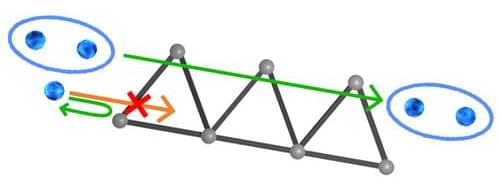Single electrons stay stationary in superconductors with “flat-band” electronic structures, which could lead to low-energy-consumption devices made from such materials.
In 2018, researchers discovered that two layers of graphene, stacked and twisted at a specific angle, could exhibit superconductivity. Theorists have determined that the electronic structure of such a twisted material approximately resembles a “flat band,” which means that the energy of the materials’ free electrons remains constant regardless of the electrons’ momenta. This phenomenon inspired a flurry of work on systems that exhibit flat-band superconductivity. However, most of the research has focused on how such systems behave under equilibrium conditions. Now Päivi Törmä of Aalto University in Finland and her colleagues have probed the behavior of superconducting flat-band systems under nonequilibrium conditions [1]. The findings could help in the design of superconducting devices with low energy consumption.
Törmä and her colleagues considered an idealized flat-band material subjected to an applied voltage, making it a nonequilibrium system. Their predictions indicate that in this nonequilibrium system the paired and unpaired electrons follow the same behavior patterns as those in an equilibrium system: unpaired electrons form stationary quasiparticles and paired electrons flow with zero resistance. Additionally, in both types of systems the flat band helps the electrons form the bound pairs required for superconductivity.









Comments are closed.